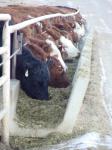Workers at Conventional Livestock Operations may be at Risk for Exposure to Antibiotic Resistant Bacteria
A recent study by researchers at the Johns Hopkins Bloomberg School of Public Health found antibiotic-resistant bacteria associated with industrial livestock workers, but not antibiotic-free livestock workers. These findings confirm earlier research on the presence of antibiotic resistant bacterial strains,  and raise continued concerns about the use of antibiotics in livestock production.
and raise continued concerns about the use of antibiotics in livestock production.
The study was based on interviews and nose swabs from workers at two different types of livestock operations in North Carolina, examining for drug-resistant varieties of the bacteria Staphylococcus aureus (Staph), which can cause a range of illnesses in humans, such as skin, bloodstream, respiratory, urinary and surgical site infections.
These conditions can usually be treated with antibiotics, but new strains of antibiotic resistant Staph were found emerging in people who have close contact with livestock animals. Researchers found that Staph that was multidrug-resistant were roughly twice as prevalent among individuals exposed to the industrial compared to the antibiotic-free livestock operation environment.


